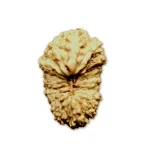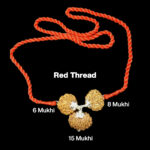Japa Meditation – The Link To A Transcendental Realm
Japa, or personal sound vibration is a spiritual practice that involves the meditative repetition of the name of God. The mantra or name may be spoken softly, enough for the chanter to hear it, or it may be repeated purely within the mind. Japa may be performed whilst sitting in a yogic posture, while performing other activities, or as part of formal worship in congregational settings. The practice of repetitive prayer is present in many forms within most religions in the world, although the faiths of India generally give more importance to it as a specific daily discipline.
Varieties of japa
In chanting japa, the repeated mantra is counted using a string of beads known as a japa mala. Within Indian traditions the Vaishnavas, devotees of Vishnu, commonly chant on beads made from the Tulsi plant (Holy Basil), who is a sacred manifestation of Tulsidevi; whereas Shaivites, the worshippers of Lord Shiva, use Rudraksha beads. There are normally 108 beads in the Japa mala and it has great significance in both traditions. It is not uncommon for people to wear japa beads around their neck as a protection from external energies or for chanting itself, although some spiritualists (such as Gaudiya Vaishnavas) prefer to carry them in a bead-bag in order to keep them hidden from bad spirits.
Goal:
The aim, or goal of chanting japa varies greatly depending on the mantra being chanted and the religious tradition of the practitioner. In both Buddhist and Hindu traditions mantras may be given to the newly initiated by their guru, after some form of rituals are performed or vows taken. The goal could be liberation from material existence or bhakti, or pure devotional to God.
The Process of Purification:
In this Iron Age (Kaliyuga), the age of quarrel and hypocrisy, chanting the name of God is the easiest and surest way for God-realization. Practice of japa purifies the mind and the heart, destroys sinful reactions and brings the devotee face to face with God. Just as fire has the natural property of burning things, so also the name of God has the potency of burning sins and material desires. Japa cleanses the heart, steadies the mind, destroys sins, cut attachment, roots out all bad desires, dispels delusion, gives peace of the mind, connects the devotee with the Lord, brings God-consciousness, bestows eternal Bliss.
Japa counteracts the force of the flickering mind that has a tendency to switch at every second. It forces the mind to concentrate on God. During japa all the godly qualities steadily flow into your mind from the spiritual realm. Japa fills the mind with goodness. It eradicates all kinds of evil mentality and inclinations to sin.
Effects of Mantra
On personal level
– Creates the connection the Lord
-Mantra impacts on the mental plane in a positive way.
– Stirs up emotions (desires, fears, jealousy from subconscious mind to conscious level as thoughts.) for cleansing negative tendencies of the mind and re programming the thinking process
– Creates potential spiritual energy
On surroundings
– Deeper, subtle & transcendental spheres
– Purification of collective conscious mind
Ex: feel good factor with spiritual people
Mantra Japa in Pregnancy
But more importantly, yoga does inconceivable tasks on the physical and mental development of the fetus. As a therapeutic tool, meditation will help you resolve the deepest of neuroses, fears and conflicts, which are very prone to happen during pregnancy. Meditation creates an incredible awareness, which helps you connect with your child in subtle ways.






